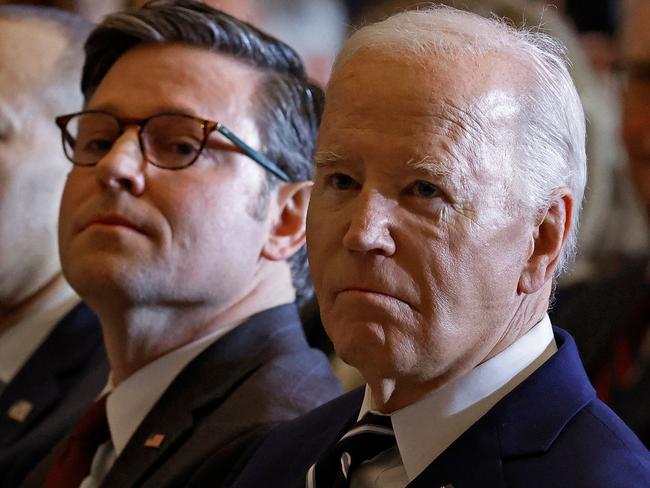AUKUS funding caught up in US fight over Ukraine aid, border restrictions
A crucial plan to speed up submarine production in the US has been caught in the middle of a bitter political dispute.
World
Don't miss out on the headlines from World. Followed categories will be added to My News.
The fate of a multibillion-dollar package needed to progress the AUKUS pact hangs in the balance, with the money tied up in a bitter political fight in the US over America’s porous border and aid for Ukraine.
After months of negotiations, the US Senate finally passed a $US95bn ($A147bn) national security bill on Tuesday (local time) which included $US3.4bn ($A5.2bn) needed to fast-track submarine production and safeguard Australia’s purchase of at least three nuclear-powered boats in the 2030s.
But even before the legislation was approved with bipartisan support, Republican Speaker Mike Johnson vowed to block it in the House of Representatives, leaving its path mired in uncertainty ahead of this year’s presidential election.
The Senate package also failed to include the money needed to renew key agreements in the Pacific with Palau, Micronesia and the Marshall Islands, putting the US on the brink of what experts said would be “a massive strategic blunder” in its effort to ward off China.

US President Joe Biden announced the AUKUS funding in October to secure the support of Republicans who had threatened to block new laws required to enable Australia’s submarine purchase if extra money was not invested to speed up domestic production.
It was included in a sweeping security package alongside support for Ukraine, Israel and Taiwan, as well as plans to strengthen the southern US border amid a record influx of migrants.
Hard-line Republicans vowed not to vote for extra Ukraine aid without border restrictions, but after a bipartisan group of senators last week unveiled what would have been the toughest border crackdown in decades, their overhaul was scuttled by Republicans who argued it did not go far enough.
On Monday, Mr Johnson refused to progress the Senate’s legislation – which did not include the border measures he opposed – because it “failed to meet the moment” and take action to stem the flow of migrants.
“The Senate’s foreign aid bill is silent on the most pressing issue facing our country,” he said.
Democrat congressman Joe Courtney, the co-chair of the congressional AUKUS caucus, urged Mr Johnson and House Republicans to follow the Senate’s lead, saying the submarine investment was needed to send “a clear signal that we are committed to meeting Navy and AUKUS requirements”.
“The Speaker’s refusal to consider it is a dangerous vote against AUKUS,” he said.
In the Senate, 22 Republicans and almost all Democrats supported the legislation, enabling it to pass 70-29. Veteran Republican Mitt Romney – the party’s 2012 presidential candidate – said it was “the most important vote we will ever take as United States senators”.
But it was opposed by allies of former president Donald Trump, who last week fought to kill off the bipartisan border proposal because it would help Mr Biden tackle the policy issue that looms as a major weakness in their likely election rematch this November.
Republican senator JD Vance claimed the extra Ukraine aid was an “impeachment time bomb” targeted at Mr Trump if he was re-elected and tried to stop funding the country’s war against Russia.
The Senate bill also failed to include $US7bn ($A10.8bn) needed to extend the three Pacific agreements for another 20 years, which Center for Strategic and International Studies senior adviser Charles Edel and senior fellow Kathryn Paik – a former Biden administration official – had warned would be “strategic malpractice of the highest order”.
They said failing to renew the deals would cede influence and military access to China, predicting that Communist Party diplomats would offer “bags of cash” to fill the breach.
The border dispute intensified late on Tuesday (local time) when House Republicans voted to impeach Mr Biden’s Homeland Security chief Alejandro Mayorkas, in a partisan slap-down of the administration’s immigration policies.
Mr Mayorkas is the first sitting cabinet secretary to be impeached in US history.
But the charges against him are expected to be rejected in the Senate, with even some Republicans questioning how his handling of the border crisis reached the impeachment standard of high crimes and misdemeanours.
“History will not look kindly on House Republicans for their blatant act of unconstitutional partisanship that has targeted an honourable public servant in order to play petty political games,” Mr Biden said.
More Coverage
Originally published as AUKUS funding caught up in US fight over Ukraine aid, border restrictions





